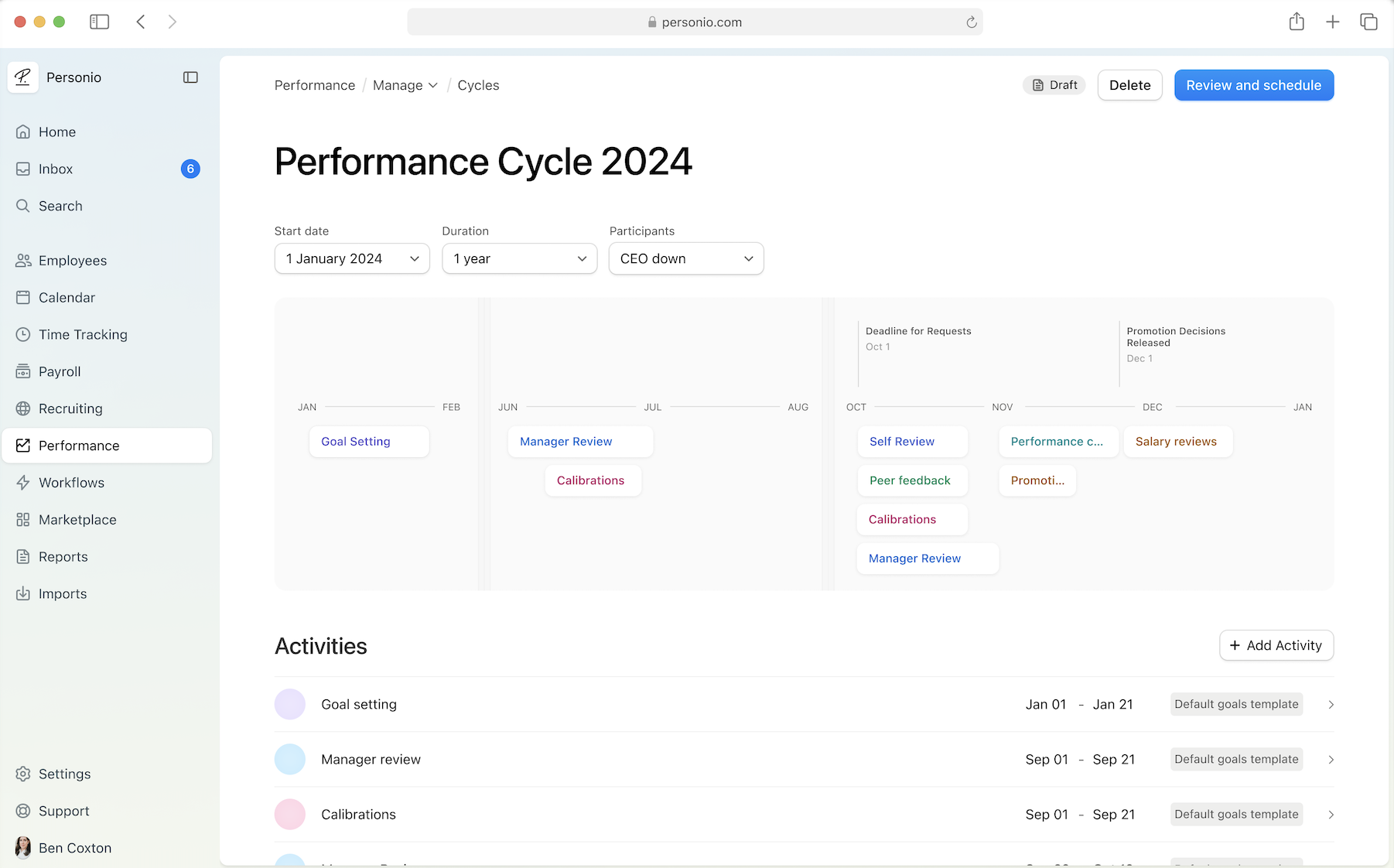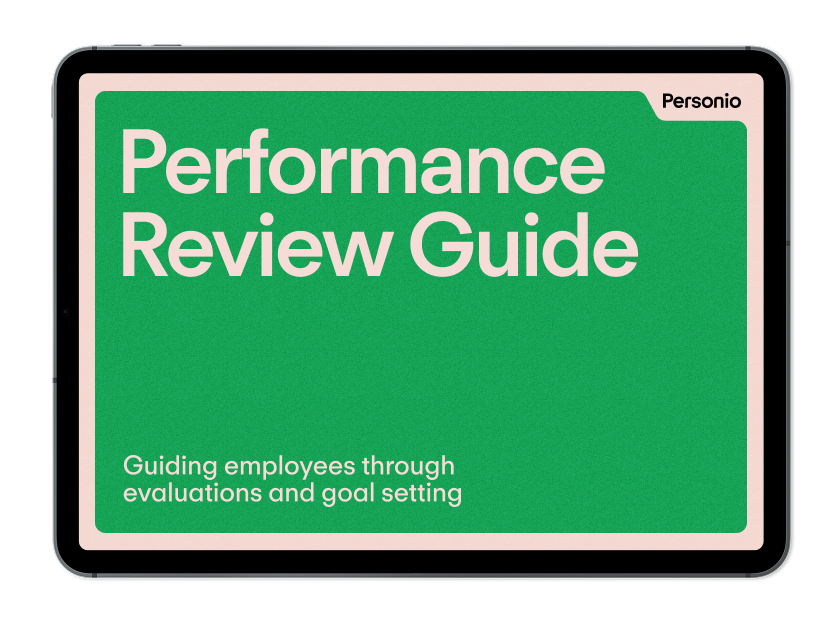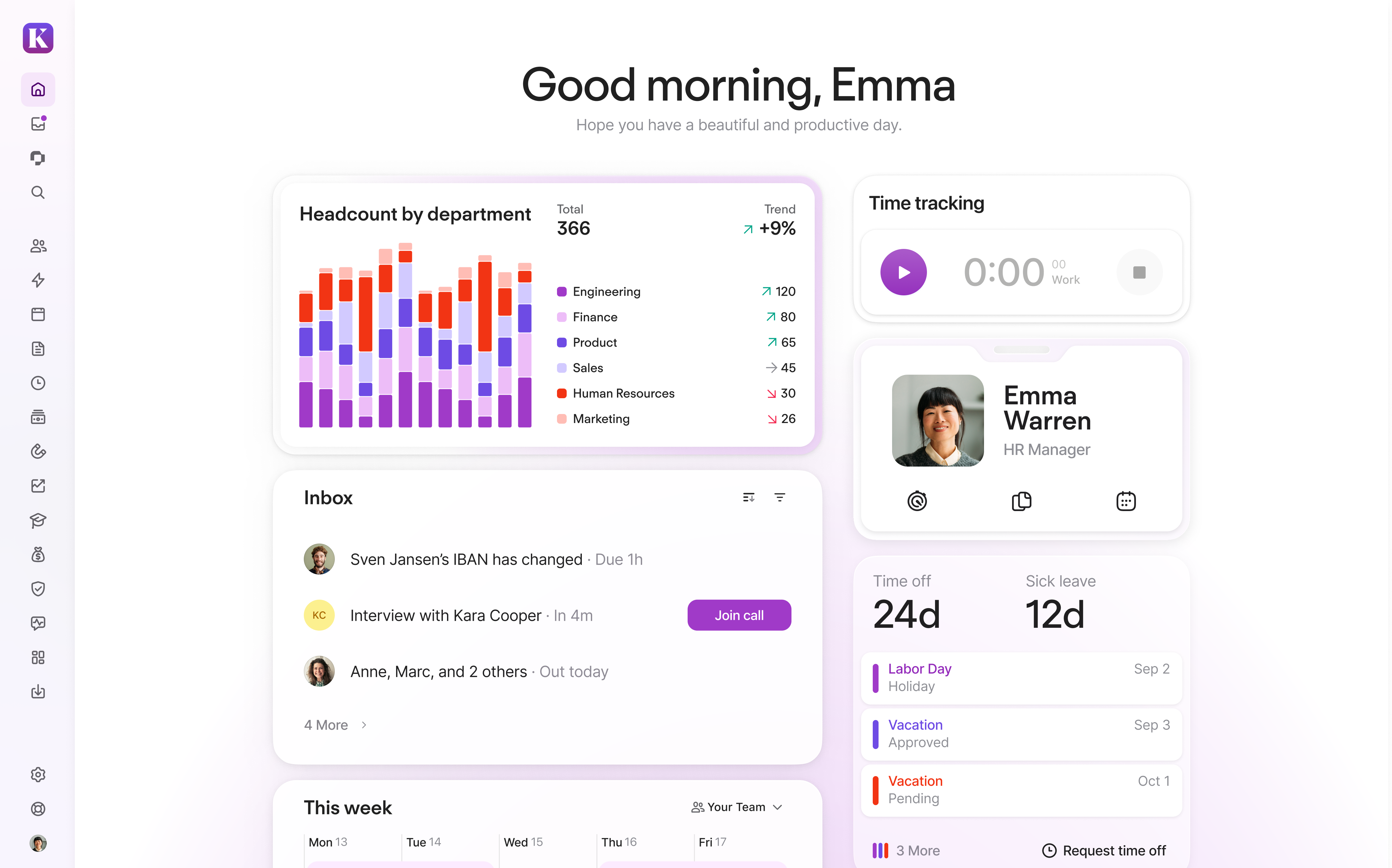
Centralise HR processes in a single platform
Create HR workflows and build better review cycles with Personio's intuitive performance management software
Find out moreWhat is a Self Evaluation and How Should Employees Write Them?

A self evaluation poses a unique opportunity for both employees and HR. This article offers a dive into the world of self evaluations, relevant examples, tips for writing them and even a template to make the process easier. We hope it helps!
Key Facts
Self evaluations benefit employees, HR and employers alike.
Honesty is a must when writing a good self-evaluation, as are practical examples and facts and figures to back up statements.
Regular self evaluations can leads to happier, more engaged and more productive employees on the whole.
Contents
- 1What Is a Self Evaluation?
- 2What Are the Benefits of a Self Evaluation?
- 3Five Stages of the Self Evaluation Cycle
- 4Guidelines for Writing an Excellent Self Evaluation
- 5Self Evaluation Examples
- 6Best Practices for Great Self Evaluations
- 7Frequently Asked Questions about Self Evaluation
- 8Self Evaluations Pave the Way for Improvement
What Is a Self Evaluation?
Self-evaluation or self-assessment is ‘a judgement made by an employee about their own work, abilities, etc., or the process of doing this’ (Cambridge Dictionary). Self-evaluating gives the opportunity to identify potential for improvement and is an integral part of the performance review together with other management tools like regular staff appraisal meetings.
What Are the Benefits of a Self Evaluation?
For employers, knowing the strengths and weaknesses of each of their employees is crucial. Usually, HR teams benefit from self evaluations in three key ways:
Helping employees feel more engaged.
Gatheringr insights and set improvement measures.
Checking if an employee’s efforts are aligned with the company’s overall mission.
By requiring regular self evaluations, a good HR team gives employees the opportunity to become more aware of their actions and tasks which they need to improve on.
For the employee, it serves as a good opportunity to initiate continuous professional development. But, how does it work exactly?
Five Stages of the Self Evaluation Cycle
Here are each of the steps required to host a great self evaluation cycle:
Writing the self evaluation
Identifying strengths and weaknesses
Defining or redefining goals
Determining necessary resources (e.g. more time, software solutions, training)
Monitoring and measuring improvements
A self evaluation gives employees a fresh point of reference to redefine their goals and adjust their access to resources accordingly.
In addition, the writing process itself is the perfect opportunity to reflect on and express thoughts, priorities and personal areas of improvement.
Guidelines for Writing an Excellent Self Evaluation
What follows are some top tips for helping enable your employees to write a great self reflection or evaluation…
1. Be Specific and Provide Examples
Facts and figures are the core of self-evaluation. Statements like ‘I am a team player and I always help my colleagues’ are of little to no value.
A practical example is much more useful: ‘I am a team player, and that’s why I helped Max finish his PowerPoint presentation in time and meet the deadline with the clients.’
By coaching your employees to give concrete examples, they can provide proof that their actions made a positive impact.
2. Frame Weaknesses as Opportunities
In order to avoid blank answers in your employees’ self evaluation report, you should explain how to phrase their weaknesses.
If your employee asks you what to do with the information in the ‘not so good’ category, encourage them to transform negatives into learnings or new opportunities.
By spotting the problem and setting a goal for your employees to gain the knowledge they need, they have already started improving in their work.
3. Use Metrics and Back Up Your Contributions
Statistics add value to your employees’ accomplishments by making them quantifiable.
For example, a simple analysis of the time sheets allows you to calculate how much or how little time your team spent on a task. When they can state how long they have worked on a project, their performance improvement becomes tangible because time is an objective criterion for measurement.
4. Note Your Achievements on the Go
Keeping notes on failures and achievements during the year is very insightful. Write down everything – positive and negative. Then divide this information into categories.
Employees can use it as memory triggers, analyse it and draw conclusions, which will improve their evaluations.
Performance Review Template: Host More Productive Conversations

Add more structure to your performance conversations today. Download our templates to help guide the conversation.
Download NowSelf Evaluation Examples
Self-evaluations vary from company to company and in some cases even from department to department. However, the following categories are common in performance reviews.
Let us offer some suggestions on how strengths could be described in an employee’s review:
Communication and Cooperation
It is crucial to explain to your employees that handling customer requests, teammate needs and supervisors’ demands are all of the same importance. If they are good at managing requests from several departments, this deserves appraisal in their self evaluation.
Suggestion:
‘I communicate well with my co-workers, managers and members of other teams’.
Nothing helps more than good communication. Creating an effective communication flow is a big accomplishment.
Suggestion:
‘I have answered every customer email within 24 hours’.
Achievements and Successes
Stating all accomplishments in a self-evaluation is encouraged. However, your employees need to find the right words to describe them:‘I am the best performer in the company’ does not work.
Suggestion:
This Forbes article can inspire you and your co-workers to phrase your achievements in a clear and concise way.
Motivation
It is worth writing something about one’s motivations and how they align with the company’s goals.
Suggestion:
‘It meant a lot to me that my department reached the … revenue milestone’.
Leadership
Every responsibility they have undertaken should be included in their self-evaluation. For example, helping younger colleagues is considered leadership.
Suggestion:
‘I trained and mentored Jane for 4 weeks, and now she is able to work autonomously with the bookkeeping software’.
Collaboration
How can they illustrate their contributions for the evaluated period to the team? A possible phrase could be:
Suggestion:
‘I proposed the introduction of weekly team meetings to discuss the current topics and problems. After considering all ideas, we were able to make our decision considering the opinion of all stakeholders’.
Innovation
Innovation is a core value for many companies. Ask your co-workers: ‘Have you brought up some new ideas at work? It could be something small, but still innovative for your workplace’.
Suggestion:
‘I brought plants to our office to make it greener and create a better work environment’.
Problem Solving
All team members have certainly contributed to overcome some challenges at work. No idea what to write here? Even a simple task like making toast deserves attention and analysis.
Suggestion:
‘I proposed to shorten the resolution time for our customer complaints by introducing a chatbot function on our website’.
Ability To Adapt
Focusing on this in the self-evaluation is important. As HR, you have to be sure your employees have growth opportunities. Encourage them to write about this.
Suggestion:
‘I am a fast learner and I have no difficulties adjusting to change’.
Best Practices for Great Self Evaluations
1. Ask your employees to define the purpose of their self evaluation. To initiate a successful self evaluation review, its purpose needs to be defined. It can have multiple purposes: as a basis for performance review for the HR team, to determine an employee’s eligibility for a raise or bonus or when evaluating single contributions to a project.
2. Be honest and objective.
It is vital to be honest and objective. Otherwise, the conclusions could be inaccurate and therefore useless. The employees should keep in mind that the point of writing a self-review is to use it as a basis for self-improvement and not to depict their perfect self.
3. Keep the syntax simple or use templates.
The syntax needs to be easily understandable. Our employee’s self-review template can help to organise employees’ writing. Using templates makes it easier to compare the results of employees, as they will all follow a guided structure. Self-Performance Review Template
Date of review Review period |
Personal data of the employee |
Name: Department: |
Performance/Achievements |
- In the past year, I managed the project … and thanks to my out-of-the-box solution to the problem … we were able to achieve the goal … in less time than planned. - Thanks to my ability to adapt, I am able to keep any project on track despite the changing situation. (Give a practical example here) - I rely on my team and am able to ask for help when needed. Big part of the problems linked to the project … were solved thanks to a brainstorming session with the whole team, which I initiated. |
Examples of excellence |
- Stepping aside of my comfort zone, I started a project of automation of the purchase orders and learned how to monitor the process, gaining new technological skills. - Over the year, I was able to meet 100% of the deadlines, and in some cases, I even submitted my work earlier than expected. - I’ve gone beyond my job description to grant better working atmosphere to my teammates by introducing the ‘happy birthday calendar’ and sending them a short greetings email. |
Areas to improve |
- I should learn to … - My performance in ... wasn’t the best, so I decided to focus on … |
Future goals and expectations |
- Spend 5% less time in … - Deliver at least one presentation on …to improve my self-confidence in public speaking. |
Comments |
With regard to … I’d like to say … |
Comments HR Manager |
Signature (Employee): |
Signature HR Manager: |
4. Keep company goals in mind
Some employees focus too much on their own motivations and goals and forget to align their review with the team or company’s targets. In their self-evaluation review, they should answer the question of how their efforts were useful to the corporate goals and contextualise their achievements within a broader frame rather than just on their own personal development.
Frequently Asked Questions about Self Evaluation
What Should Be Mentioned In a Self Evaluation?
Everything. You should be honest and include each relevant piece of information about your performance, even though it might seem unimportant to you.
How Do You Evaluate Yourself and Your Performance?
Start by listing everything that comes to mind when thinking of your performance as an employee. Be objective and provide practical examples of your achievements.
What Should I Include in the Section ‘Areas for Improvement’?
Do not be afraid to admit your failures. Mention your weaknesses as opportunities to learn. This way, you will also demonstrate that you are willing to develop professionally.
What are Three Areas for Improvement?
This is a typical question you can find in every HR questionnaire. How to give a response without exposing yourself? There are three areas where one can always do better – communication, time management, and tech skills. Our tip to employees: Try to propose possible improvement measures while answering the question.
Self Evaluations Pave the Way for Improvement
A self evaluation is all about employees and how they assess their own performance. If you are an HR manager seeking advice on how to better manage and introduce performance review, we can help you with our Performance Review Template. Or, you can learn how to run a seamless performance management cycle by clicking this link.
